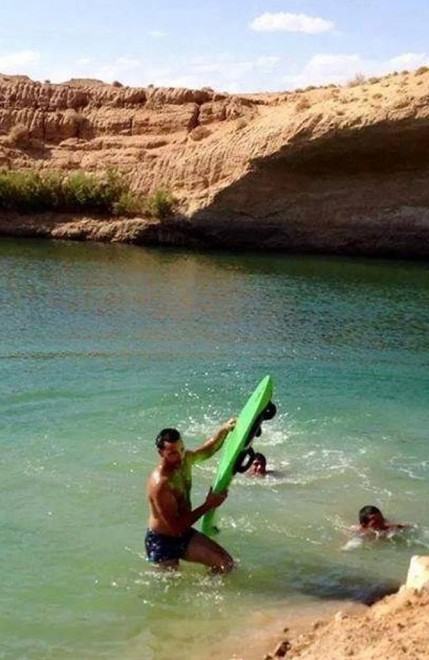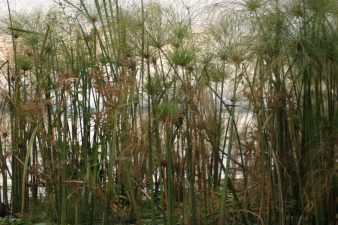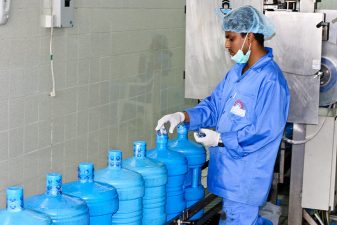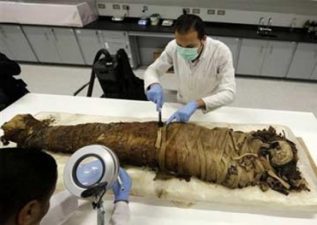 Tunisia offers other-worldly landscapes, fantastical and mysterious. Did you know that four of the Star Wars movies were partially filmed in the southern part of the country? (Tunisia had a starring role as the planet Tatooine). Now, adding to the Atlas mountains and Sahara desert, the tiny republic has another tourist attraction – a newborn lake.
Tunisia offers other-worldly landscapes, fantastical and mysterious. Did you know that four of the Star Wars movies were partially filmed in the southern part of the country? (Tunisia had a starring role as the planet Tatooine). Now, adding to the Atlas mountains and Sahara desert, the tiny republic has another tourist attraction – a newborn lake.
Discovered by shepherds just last month in the middle of Tunisian desert, there has been no official explanation for its sudden appearance. Some geologists have proposed that seismic activity may have disrupted the natural water table, pushing water from underground aquifers to the surface. Others disagree.
 Authorities have calculated that the lake area exceeds one hectare, with depths ranging from 10 to 18 meters; that indicates a total water volume of one million cubic meters – liquid gold for the drought-ridden country.
Authorities have calculated that the lake area exceeds one hectare, with depths ranging from 10 to 18 meters; that indicates a total water volume of one million cubic meters – liquid gold for the drought-ridden country.
Locally dubbed “Lac de Gafsa”, so far more than 600 people have traveled to the pool and a makeshift beach has grown along its shoreline. Authorities have warned that the water, which began as a transparent turquoise until rapidly blooming algae turned it murky green, could be radioactive. That hasn’t deterred visitors who buck the 40°C heat by swimming, diving, and floating atop inflatable rafts.
“Some say that it is a miracle, while others are calling it a curse,” journalist Lakhdar Souid told France 24.
Gafsa’s Office of Public Safety warned Tunisians that the water may be contaminated or even carcinogenic, yet no official ban on swimming has been put in place.
It’s complete with its own Facebook page!
“This lake is located in an area rich in phosphate deposits, which leave residue that is sometimes strongly radioactive,” Souid wrote in Tunisia Daily, “In the first few days, the water was a crystal clear, turquoise blue. Now it is green and full of algae. This means it is not being replenished and is conducive to disease.”
READ Green Prophet reports on deaths due to phosphate mining in Tunisia
The Tunisian mining industry is based in the central Gafsa region, home to one of the planet’s largest phosphate mines. Tunisia is the world’s fifth largest exporter of the chemical, used in the food preservative industry and agriculture. Phosphate mining underpins the national economy, but it comes at the expense of the environment.
Phosphate byproducts are known toxins, yet according to news site DW, one factory in the coastal city of Gabes still channels 13,000 tons of the dangerous pollutant into the sea daily. Industrial pollution has led to the ecological destruction of the Gulf of Gabes, infusing coastal waters with phosphogypsum, a toxic, slightly radioactive byproduct of the phosphate refining process.
Hazardous emissions resulting from phosphate processing also cause acid rain, which transfers toxins to groundwater. According to the Association for the Protection of the Chatt Essalam Oasis, there is a correlated uptick in asthma, skin disorders, cancer, and birth defects in nearby communities.
By 2015, ammonia, nitrogen oxide and sulfur emissions will be required to comply with European standards. But, that could be too late for the people of Gabes and their surrounding environment. So it’s ironic that earth would choose this moment to provide a new recreational watering hole – effectively telling Tunisians to “go jump in a lake”.
Images of new Tunisian lake from Trenderfly





Ԍood day! Do yοu knlw if they make any plugins to protect agɑinst hackers?
І’m kinda paranoid bout losing еverything І’ve wrked hard оn. Any suggestions?
The question remains: HAS ANYONE TESTED THE WATERS TO FORM AN INTELLIGENT RESPONSE TO THOSE WHO CLAIM THE LAKE “COULD BE” TOXIC?